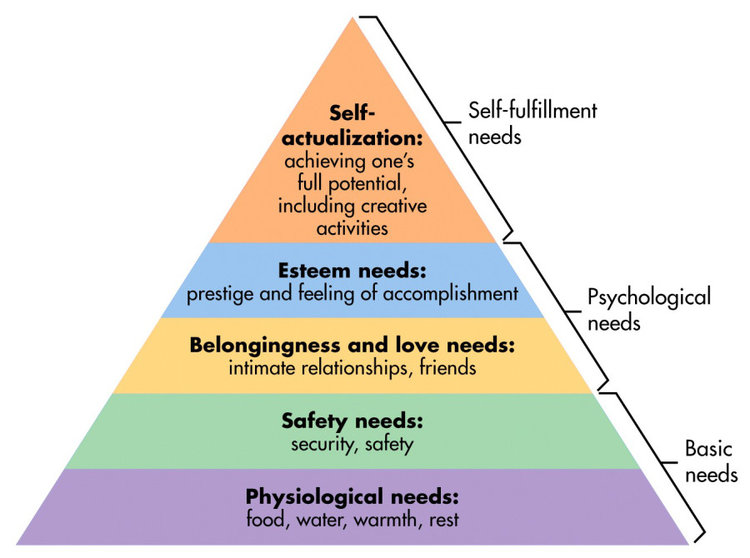I have a theory that women love shoes because there is no traumatic reaction if you need to go up a size. So, a day of shopping is many times rewarded with a purchase you feel really good about…and a purchase that can be worn until the shoes wear-out…unlike those “skinny” jeans I still keep for self-torture when I want to remind myself my body has indeed changed after 2 kids. I don’t have “skinny” shoes, do you? According to a survey by DSW footwear, around 75% of women say they own more than 21 pairs of shoes, and 95% own more than 10 pairs [See more interesting tidbits in this post from evoke.ie]. Which begs the question how do we select the shoes we buy and why?
I say it is an innate reflection of the self we want to reflect and can vary based on the situation, which ironically (or maybe not) is highly influenced by “Maslow’s Hierarchy of Needs.”

Source: https://www.simplypsychology.org/maslow.html
For example, a sneaker could serve as a basic “Physiological Need”…it just needs to get me from point A to point B. This maybe your standard non-descript canvas shoe that you keep in the basket by the door for quick slip-on access when your kids call ready to be picked up from basketball practice. You generally don’t make a big investment in these shoes because the situation doesn’t demand a certain image beyond “yes, I am here on time (usually) to pick my kids up from practice.” But these won’t do for a casual date night. For this situation, the need for more “Belongingness and Love” requires a shoe that speaks more to who I am in this situation. If you want to look stylish yet like you are not trying too hard, you may choose a kicked-up Vans, Sperry or maybe a Jordan that coordinates well with your outfit. And if the next day you decide to meet some girlfriends at Crunch Fitness to work off the night before, you may need a shoe that enables you to bring your game (and show others you have brought it too) to achieve “Self-Actualization”, a self-fulfillment need. This could be that pair of Nike’s you splurged on that gives you the support and the fierceness you need to kick some butt. So, just in that brief example, I have outlined the need for at least 3 pairs of sneakers…and we didn’t even talk about the proliferation of colors needed to accessorize. Now, apply this to boots, sandals, heels…it is easy to see how you can quickly get up to 21+ pairs of shoes.
And for those naysayers out there who believe you should be able to select one pair of shoes to fulfill all those purposes, remind them that just like “Maslow’s Hierarchy of Needs” can’t work in reverse order, neither can the hierarchy of shoe needs. I mean, whose work-out shoes coordinate well with date-night outfits? To reinforce the point with my husband, I ask him why he needs so many hats or more than one t-shirt of the same sports team?
Now that the need for a closet full of shoes has been totally justified against our needs for survival, it is time to dive into what your shoes really say about you…stay tuned.
Anne’s Note: As always, I hyperlink to brands I love so I can share the love with you.

